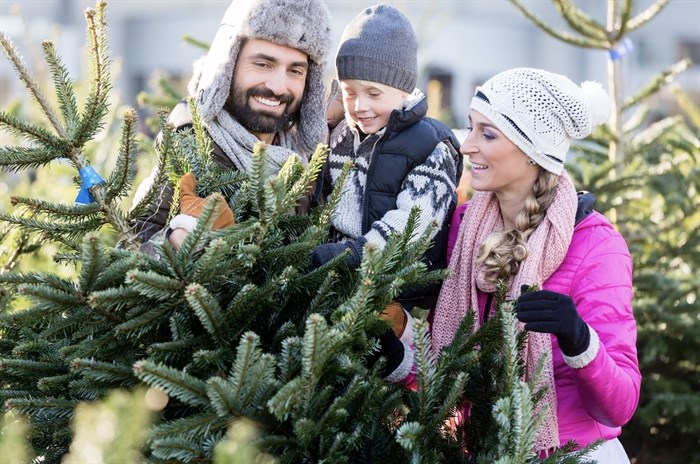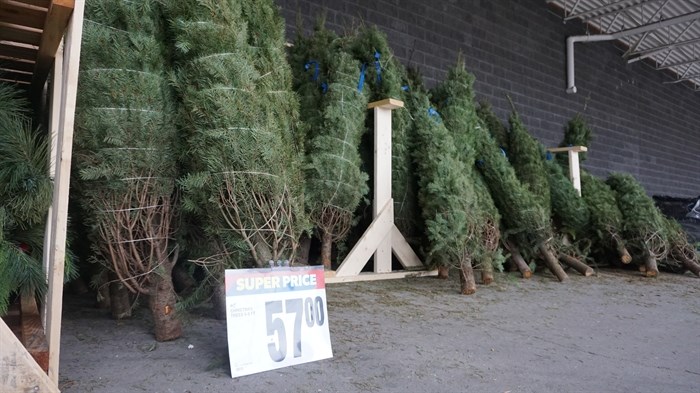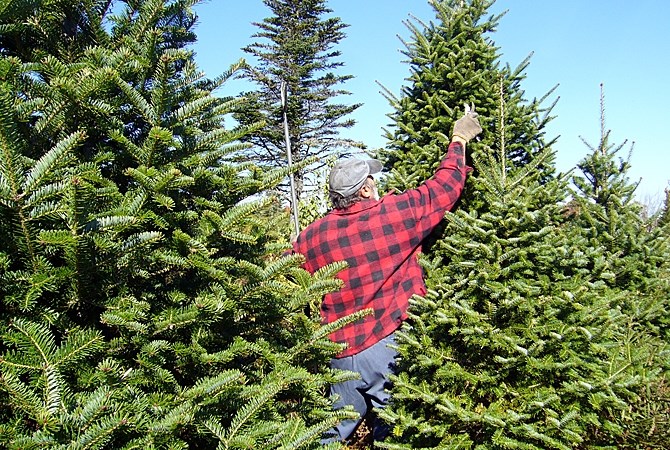
FILE PHOTO
Image Credit: ADOBE STOCK
November 30, 2023 - 7:00 AM
A combination of poor weather conditions, changing business plans and competition from the United States has meant that many Okanagan Christmas tree farmers have left the business.
Most Christmas trees in Canada are grown in Quebec, New Brunswick, the Maritimes and Ontario, rather than British Columbia, Richard Hamelin, UBC professor of Forest Conservation Sciences told iNFOnews.ca.
“What shocks me is that a lot of the Christmas trees that you'll buy comes from the U.S.,” Hamelin said. “It turns out we import a lot of Christmas trees from the U.S. just because they have more farms there and they have more capacity. And so, it's mind boggling that in Canada and in B.C. we would actually buy Christmas trees that are grown in Washington State or Oregon.”

Christmas trees for sale outside of Real Canadian Superstore, Kelowna.
(GEORGINA WHITEHOUSE / iNFOnews.ca)
This fact is even more astonishing when you consider the ideal growing conditions in the province and B.C.’s native coniferous species.
According to the BC Christmas Tree Association, B.C. Christmas tree growers produce some of the finest trees in Canada. However, more and more farmers are giving up the business in the Okanagan.
It turns out, the Christmas tree business requires a big long-term investment as it can take anywhere between six and twelve years for a tree to reach maturity.
Because of this, during the pandemic, a new wave of farmers retired or decided to do something more fruitful with their land, Hamelin said.
"(During the pandemic) people started staying home for Christmas instead of flying to exotic places, then everybody wanted to have a Christmas tree all of a sudden and there was this huge demand,” he said.
This — combined with retiring farmers, a heat dome in 2021 and invasive pests that caused major crop damage — brought the local industry to a screeching halt.
“Christmas trees in particular need to be perfect, right?” Hamelin said. “That means that Christmas tree farmers have to spend a lot more money and time to make sure that the trees get the right amount of water and then the pesticides and so on. And so, there's more losses to the farmers when there's these droughts and these pest attacks.”
Because of the shortage of local trees, prices are likely to rise which may divert consumers towards trees of the plastic variety.
Live trees come with a catalogue of environmental problems, but not necessarily more than their plastic counter parts. It’s a deeply contentious debate, on which the jury is still out, Hamelin said.
“(For live trees) you need tractors, you need to spray, usually they use fertilizers and pesticides, herbicides,” Hamelin said. “It’s not worse than any other crop, but it's like any crop. It's energy intensive so it's carbon intensive. All those tractors and the chemicals that you use to spray, all that uses carbon sources... Then after that, of course, you put them on trucks and then you ship them."
While a plastic tree can be reused for decades, it can’t be recycled in the same way a live tree can.
“If (a live tree) is recycled, it's just basically part of the cycle of life,” Hamelin said. “It'll decompose and it'll make organic matter and then more trees will be planted.”
A more sustainable alternative is potted trees, which can be replanted after being used as a Christmas tree.
“Then your Christmas tree will continue to contribute to carbon fixation and to providing all the services like clean air and so on and so forth after it's served the purpose for a couple of weeks,” Hamelin said.

Image Credit: FILE PHOTO
Of course, there’s also the option of heading into the bush and chopping down your own tree. In BC, this is fairly easy to do. All you will need is a permit and an axe.
There’s also little environmental impact that come with cutting your own tree, Hamelin said. Any negative effect would be aesthetic and a drop in the ocean compared to the damage done by logging.
Classic Christmas tree species include the Douglas fir, noble fir, and Fraser fir, however a new species to Canada, the nordmann fir, could be ideal for farming in the dry Okanagan climate. The species originates near Turkey and is particularly drought and disease tolerant.
Although some of these species are non-native, they tend not to pose a risk to the natural landscape, Hamelin said. This is because farmed trees are pruned regularly to give them their classic conical shape and therefore don’t go to seed.
Dick Lamberton’s Grumpy's Christmas Tree Farm in Kelowna is one of the farms staying open this holiday season, but his stock is quickly selling out.
“I brought in 100 pre-cut trees last Saturday and I've already sold half of them,” Lamberton told iNFOnews.ca.
Lamberton also has 100 home-grown trees, which he predicts will be gone as soon as he puts them up for sale on Dec. 2. However, in previous years he has sold plenty more.
“We lost a lot of trees to that heat dome. I lost two years growth. All of my trees that were two years and under, I lost in that heat dome,” he said. “Then I lost a bunch more to a disease.”
Lamberton said he assumes his competitors stopped growing for this reason.
“I was fortunate enough, I changed over my trees. When the bug first came up, I switched my whole field," he said. “But I've got to manage it by only selling 100 trees a year probably for maybe five years.”
Despite this, Lamberton said he’s only raising his prices by a minimal amount.
“I try not to do that to people,” he said. “I haven't jumped it up just because there's no trees around. I don't want to get into that.”
Adam Woodward from Woodward Christmas Trees in Kamloops said his farm was also impacted by the heat dome, but he’s staying open this season.
“We lost quite a few of our trees as a result of the heat wave,” he said. “What we've sort of been forced to do is bring in trees from high elevations, from the forest in the Coquihalla.
“We have a limited supply of them this year. It's just kind of what mother nature's dealt for us here. We're trying to keep the tradition going here at the at Woodward farm.”
He said succession planning is a problem facing the industry. As the trees take so many years to grow, plans for the future need to be solid.
“It's difficult to hand over from one generation to the next and we’re still doing it here,” Woodward said. “And we've always had these traditions and the values of family here at the farm. It's our passion to promote that and provide a space for people to spend that time with their loved ones.”
This year, his farm will be offering additional activities such Christmas displays, Santa Claus, food trucks and mulled cider and wine.
For UBC's Dr. Richard Hamelin, buying local is always the way to go.
“These are species that we have naturally and if it supports a farmer to get a natural Christmas tree, I'm all in favour,” he said.
To contact a reporter for this story, email Georgina Whitehouse or call 250-864-7494 or email the editor. You can also submit photos, videos or news tips to the newsroom and be entered to win a monthly prize draw.
We welcome your comments and opinions on our stories but play nice. We won't censor or delete comments unless they contain off-topic statements or links, unnecessary vulgarity, false facts, spam or obviously fake profiles. If you have any concerns about what you see in comments, email the editor in the link above. SUBSCRIBE to our awesome newsletter here.
News from © iNFOnews, 2023